Hello darkness my old friend, I’ve come to talk with you again.
Simon and Garfunkel’s lyrics could not be more appropriate as I stare down the barrel at a period of confusion, frustration, sadness and anxiety that inevitably follows a large adventure.
Although this article focuses on the post-adventure blues, I’ll be quick to add that the topics discussed could quite easily relate to many other milestones in a person’s life. A big project at work. Writing your first book. Completing your first half-marathon. Getting married. Anything which you have worked tirelessly for, and focussed single-mindedly on for a significant period of time – only to find yourself on the other side of it and asking ‘Now what?’
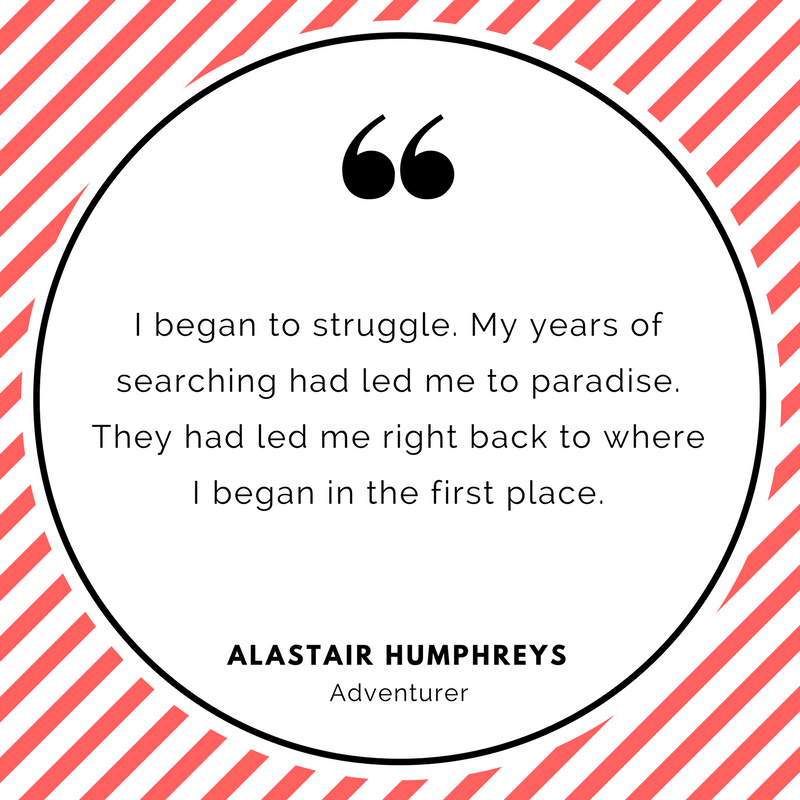
As I write this I have been home from the Andes Mountains for almost three weeks. There I pedalled for 6 months – covering 9,000km through three countries and tackling over 100,000 metres of ascent. But I know full well that the challenges of the road pale in comparison to the challenge of returning home.
I’m rather proud of how I’ve done on the blues front so far. Alas, this week they have proudly announced their arrival. Characterised by a desire to lock myself away and not speak to anyone, bouts of frustration, teariness, feelings of hopelessness and an overwhelming sense that I am wriggling in a pool of quicksand, and could go under at any minute.
So let us start with where it all begins….
WHY DOES THIS HAPPEN?
The post adventure blues are a completely logical after effect. In fact, if there wasn’t some kind of change in mental state after striving for something and pushing yourself to achieve it, I would say that you didn’t push yourself hard enough in order to achieve it. The blues are a sign that you have taken a rocket ship to the outer edges of your comfort zone, and found yourself a little starved of oxygen out there. You have seen and experienced things that will take a while for you alone to understand, and even longer for you to explain to others.
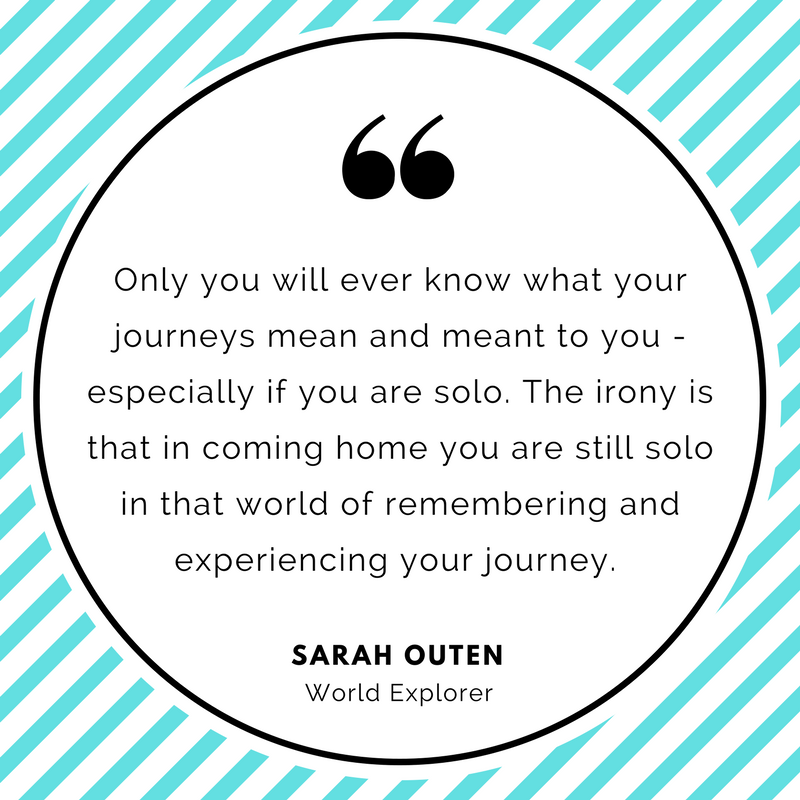
While on adventures you have a concrete and simple goal, a goal which you inch closer towards achieving every day. Your rewards are daily and immediate. Events, people, places – they crash into and exit from your life at an alarming rate. Above all, there is a huge sense of freedom out there on the road.
After the adventure, time seems to move much more slowly. Things don’t happen immediately, progress isn’t tangible anymore, you are weighed down with obligations and gratification is far from immediate.
The pure physical chemistry of the blues makes sense too: for months on end you have been addicted to a cocktail of chemicals, including but not exclusive to – adrenaline, endorphins, cortisol, serotonin and dopamine. You are riding from one fix to the next, an extreme high and then a deep low. Back home and the cold light of day, the surge of chemicals subside and it’s not surprising that you feel numb.
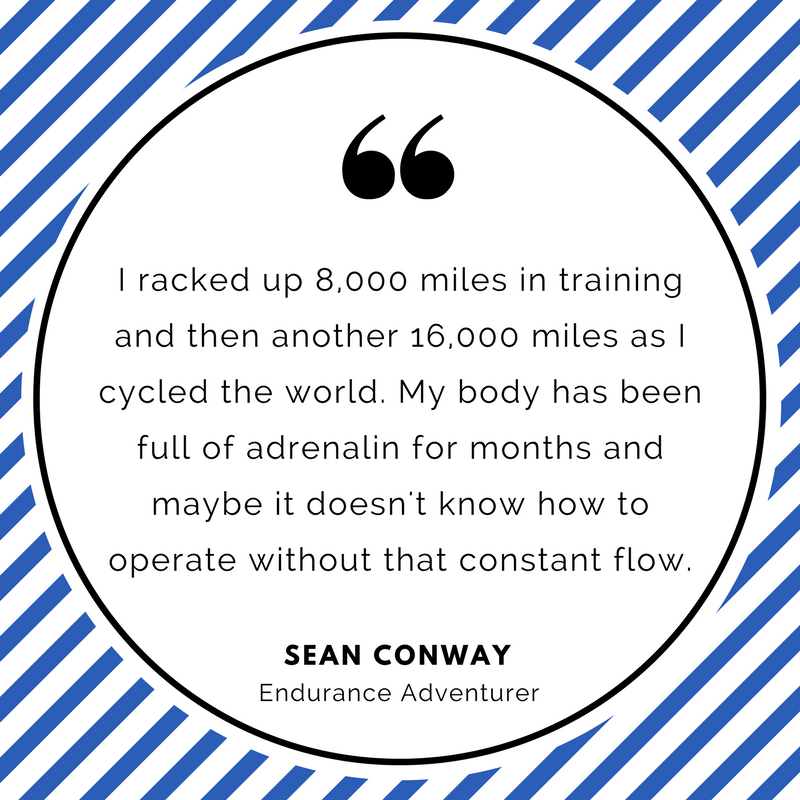
TIPS FOR DEALING WITH POST-ADVENTURE BLUES
I am far from alone in facing these kinds of emotions. I’ll never forget October 2015, when I was sat in the audience at the Women’s Adventure Expo, watching Polar Explorer Felicity Aston give a talk.
At the end of a brilliantly funny and insightful speech, Felicity described how upon returning home from a solo trek across Antartica, she felt like a stranger in her own life. As if she were sitting just behind her head, watching her body go through the motions from a distance. I wanted to leap up and scream: ‘YES! Me too! I am not MENTAL! Thank you for making me feel SANE!’. I didn’t do it, but it’s what I would have said, had the rules of audience etiquette not been observed.
A quick google will turn up a number of other articles on the subject of post-adventure blues, and fellow adventurers I’ve spoken to, report a mix of similar feelings. So here’s the top pieces of advice to help navigate the maze of emotions upon returning home:
1. Let it roll
It’s important to realise that you cannot ‘stop’ the blues. In fact, tying to prevent any form of depressive or complex emotions from entering your life is a sure fire way to a disaster – that much I have learned. Instead it is better to welcome them in, as if they were, perhaps, a guest at a dinner party – one who you’re not particularly fond of, but you’d like to hear what they have to say all the same. Really no different to any episode of ‘Come dine with me’.
Invite the blues in, sit them down and listen to them. Thank them for their concern and do what you can to understand the point they are trying to make. Just shutting the door and leaving them out in the cold won’t make them go away.
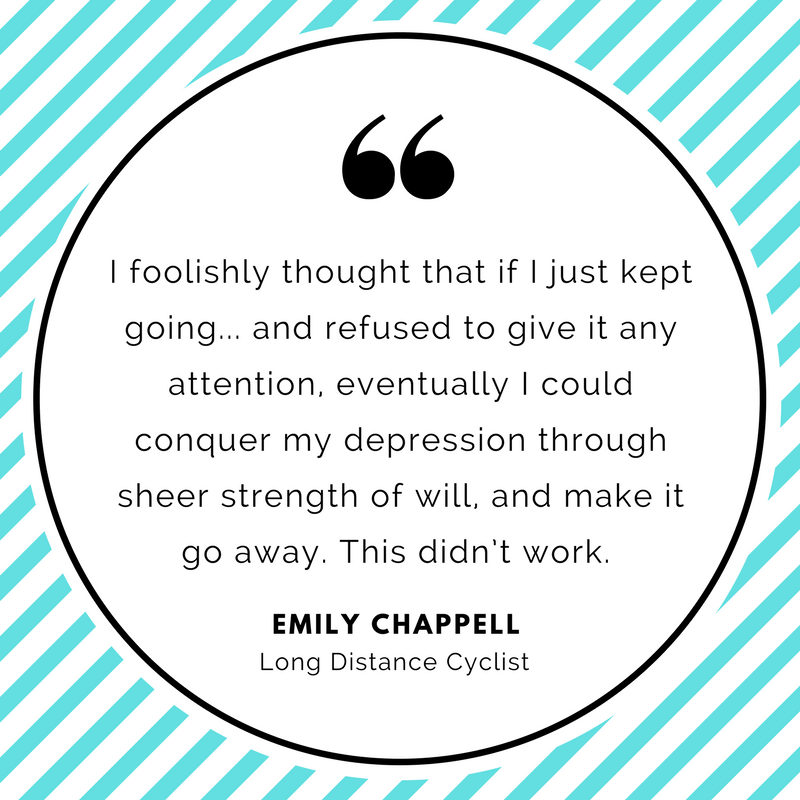
2. Be purposeful
Setting an intention to make considered, purposeful decisions after your adventure is key. On previous adventures I have failed miserably at this and found myself rushing around, tumbling mindlessly from day to day – caught up in the trap of living reactively, as opposed to proactively.
Within a week of finishing the New Zealand run in 2015, I’d booked a new trip away, sorted a place to live and lined up a new job. It was ridiculous how quickly I tried to move forward with life.
The upshot was that I didn’t deal with the post-adventure blues. Instead I let them pile up. Sure enough, three months later, the blues hit like a steam train. They were the worst I’d ever experienced, and I hope never to go to that dark place again (although I’m sure I will).
Post Andes expedition, I wake up each morning and I ‘watch’ my thoughts. I explore them, I question them and I try to understand what they are doing there, laying at the end of my bed waiting for me. I even sometimes times find myself talking to them:
“Thank you Ambition, I know you’re frustrated that things aren’t moving as fast as you like, I appreciate your concern, and I know I’ll get there.”
or
‘Hello Melancholy. Nice to have you here. You don’t fancy going outside today? Just want to stay indoors? How about we go for just a little walk?”
The time around, being purposeful has included coming away from home again as soon as possible. In being physically separated from my home life, I feel I have the time and space to make very deliberate decisions regarding what I say yes and no to. This technique might not work for everyone however – others, including world explorer Sarah Outen and ocean rower Laura Penhaul say it’s important to face reality and settle back into home life as soon as you can:
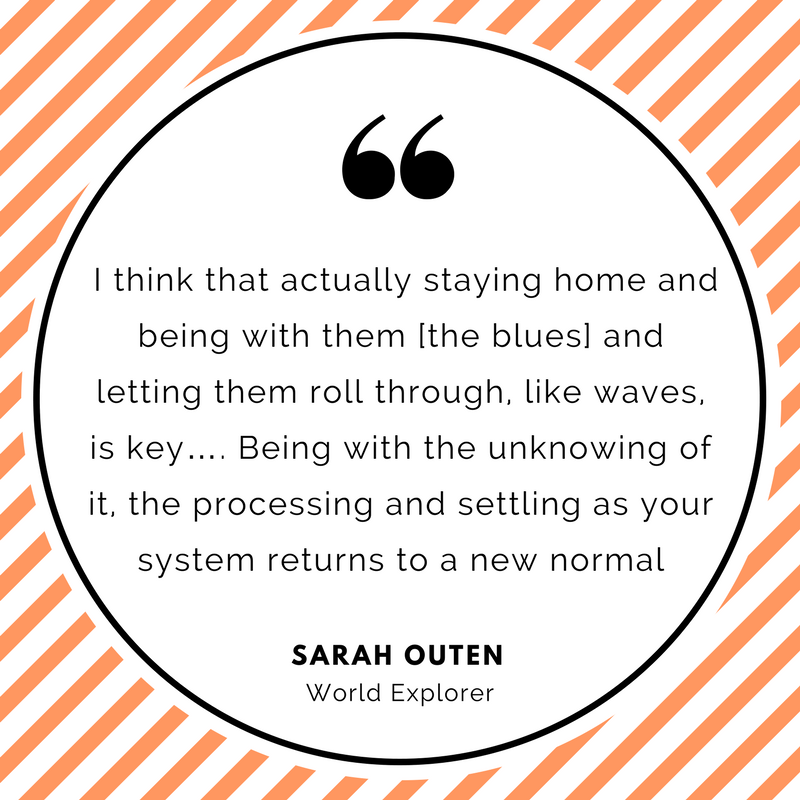
3. Be patient
That mass of grey matter bobbling around inside your skull is a complicated thing. It doesn’t care that you’d quite like to feel jolly again and get on with life. It must do what it needs to do, and so in return you must be patient. Understand that it will likely take longer than you think for things to slot back into place.
When I’m asked what it feels like to end and adventure, I always reply that it feels like the break up of a relationship. There were tough times, and there were wonderful times – but now that thing you held so dear to you is gone, and life is different, somehow. You must grieve for it. The experiences it’s given you have weaved their way into the very fabric of your being and will shape you in years to come. In the end you will smile fondly, but right now – you must let it go.
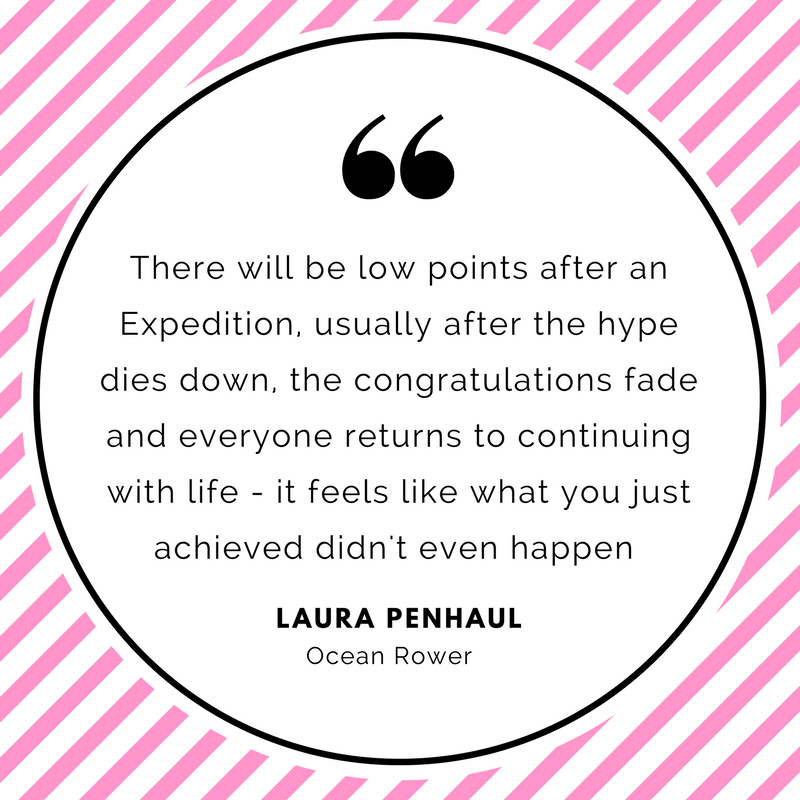
4. Shift your focus
My default is to say yes – I’m a yes person. And I’ve made many a mistake in the past about committing to a next challenge / goal / aim too soon after finishing an adventure. In years gone by if you ever wanted anything from me, you just need ask me right after finishing a trip. I would have said yes to anything in a heartbeat.
I have learned my lesson, and I now don’t like to put anything concrete in my diary after the trip, but I do like to shift my focus. I usually do this through learning. I watch talks, films, boxsets, documentaries, but most of all – I immerse myself in books.
These things allow me to escape into someone else’s world for a while, and become a student their lives whilst I am processing how to become the master of my own.
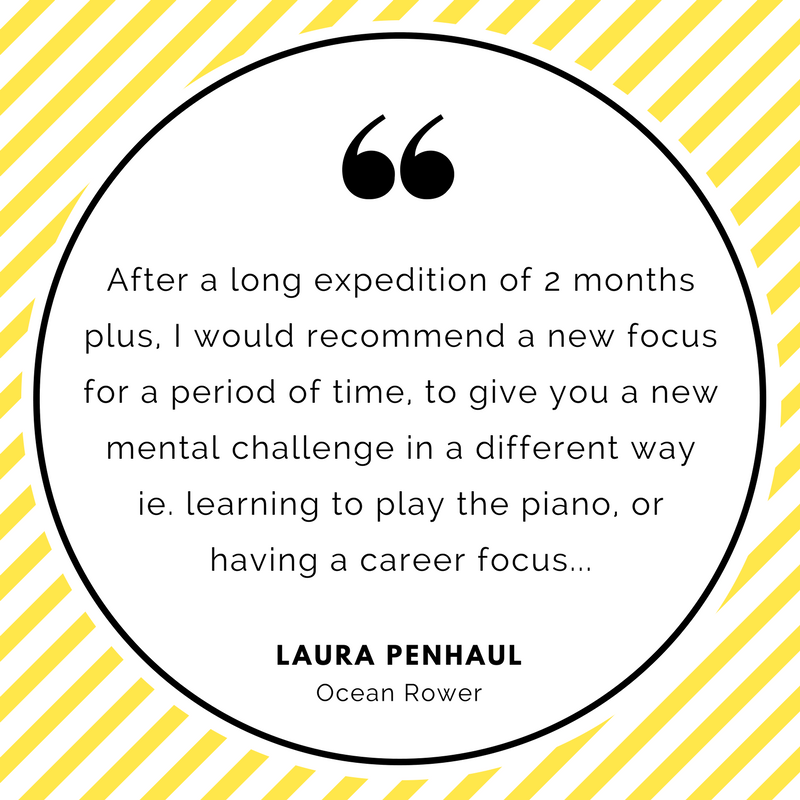
5. Make time to get outdoors
The great outdoors has a wonderful ability to heal even the most complex of ills. Even if you’re not an adventurer, being outside, hanging out with the odd piece of shrubbery – it’s good for the soul. There’s countless studies that prove this to be the case, it’s why they put plants in offices you know (although don’t make the mistake I did and try to water the plastic plants). Out there, it’s hard not to feel humbled, and how can life possibly be grey, when the world around you is so full of colour?
I often fall into the trap of trying to ‘progress’ by being sat behind a laptop. The double edged sword of a life as a writer, speaker and adventurer means that a lot of my day involves me existing within the 13 inch screen of my Macbook.
But even ploughing through everything on your ‘to do’ list won’t make the blues go away (when do you ever reach the end of your to do list anyway?!). What will help is shutting down the laptop and getting outside. I write this here, because I need to remind myself on a daily basis. In fact, I’ve been sat here far too long writing this blog… (To the shrubbery!)
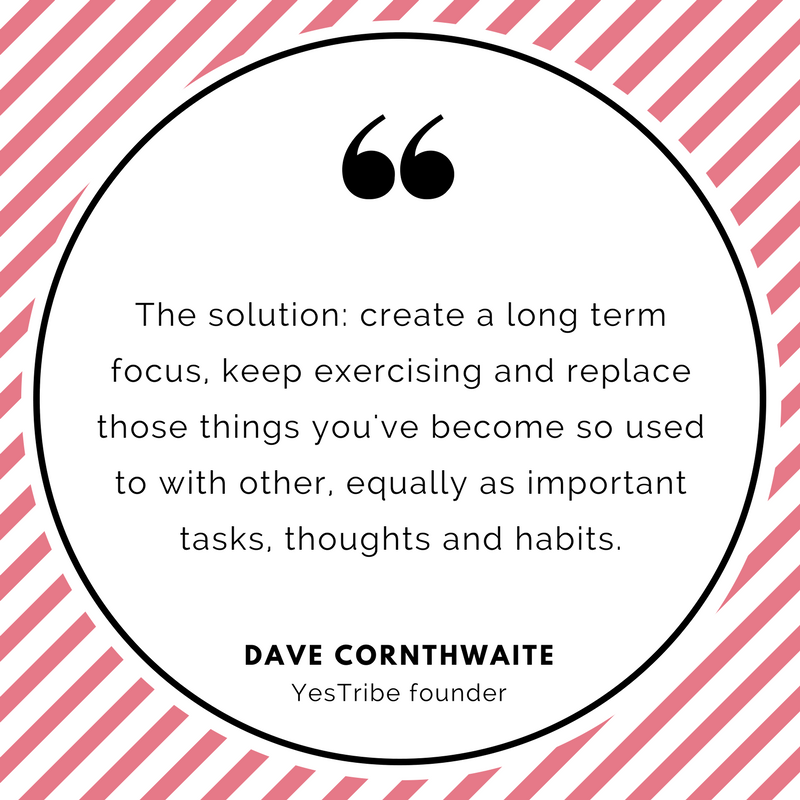
6. Spend time with close friends
Today, I have a fizzy feeling in the pit of my stomach. Because tomorrow I am returning home to the UK from this short break in France, and I have, for the first time since finishing the adventure, a fair few social engagements in my diary. I have people to see and places to be, and I don’t like it one bit. But I also know that spending time with close friends, ones that I have known for years and truly ‘get me’ is the best tonic for the post-adventure blues.
Identify the people who love you whether you are on top of the world, or dragging yourself through the sewers. Write their names down, and prioritise spending time with those people. They will lend you their sparkle while you relocate your own.
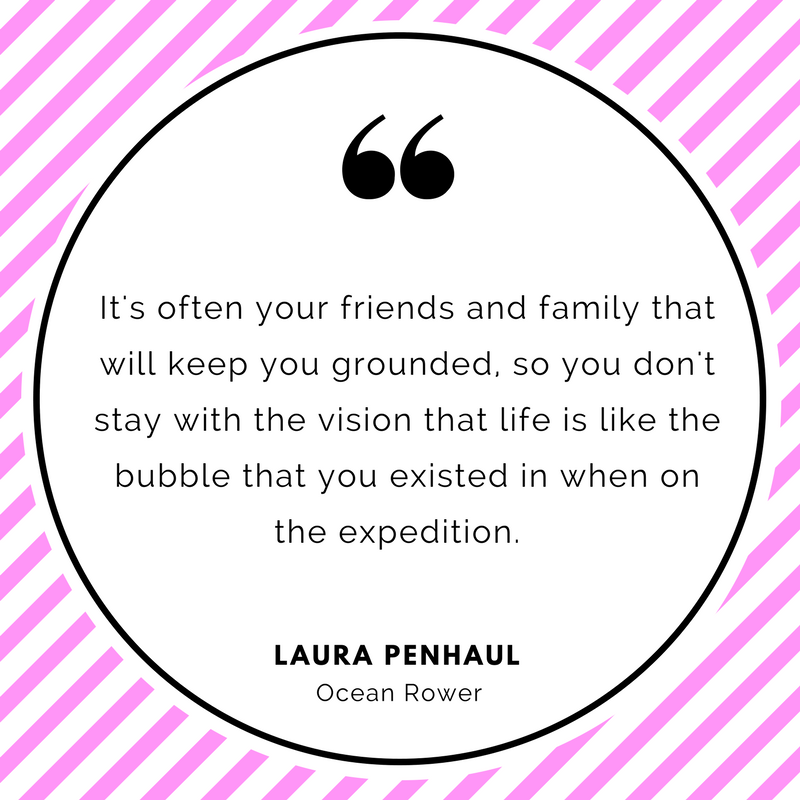
7. Say ‘No’ and banish ‘Should’
‘Should’ is one of my least favourite words in the world. Should piles on the pressure and hangs like a lead weight around each of our necks. Whether you’re returning from an adventure or not – should is the arch enemy of the time poor, especially when accompanied by its evil sidekick, guilt.
After an adventure I should have more money in my bank account, I should do x because it is the sensible thing to do, I should go and visit x, catch up with y. I should probably say yes to that thing that I really want to say no to, because it could lead to something that would help. Should. Should. Should. It drives me barmy.
And so I change should to could. Because could means that when an opportunity arises, I feel that I have the freedom to consider it fully. And once I’ve considered it, I can say no.
Saying no is one of the most liberating things in the world. In fact, in his book ‘The Art of Essentialism’ Greg McKeown, advises that we say no to everything (in our minds, at first) and then convince ourselves why we should say yes. I like this idea and use it whenever I remember. I still say yes far too much, but as time goes on, I’m getting better.
Say no. Banish Should.
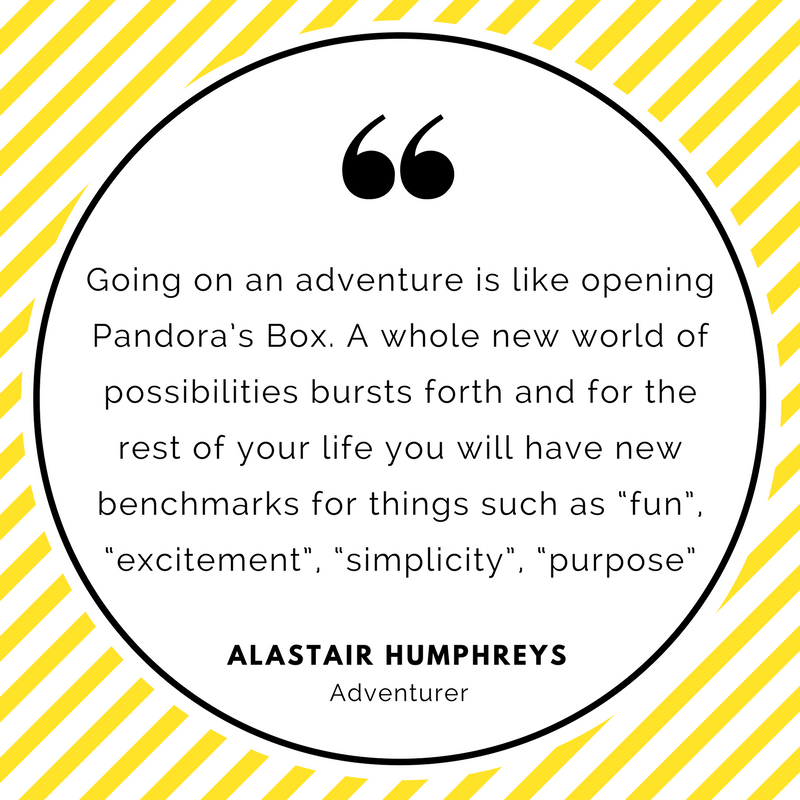
8. Eat well
This one goes without saying, and there’s no excuses. I am a sugar junkie as much as the next person, but I also know that it makes me feel sluggish, bloated and lethargic. The same with bread and other wheat based goodies.
Take control and make good choices about what you eat when home, and your mind will begin to make better choices too. I still have my vices – I drink a truck ton of coffee (although not after 2pm or my brain goes nuts at night) and I eat a lot of chocolate too. But I also get plenty of eggs and piles and piles and piles of vegetables into my belly. That makes my belly happy. And a happy belly equals a happy brain.
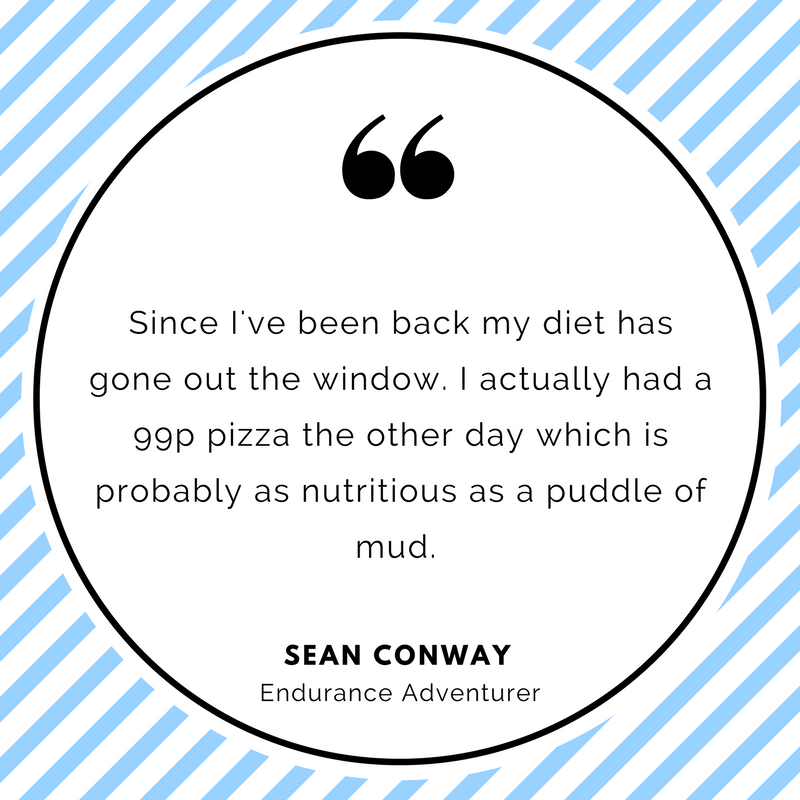
9. Sleep well
I used to run on 4 hours sleep a night, through my late 20’s – loving the London life, doing everything I could, chasing down opportunities, saying yes a lot. If I had more to do, I could always just sleep less. I was a wreck.
In the last 2 years, I have fallen back in love with sleep. My Mum and I disagree vehemently on the topic – she views time in bed as time in life wasted. But I know that if I don’t get at least 8 hours a night, I am scratchy, irritable and I make terrible choices. I then eat terrible food to try to make me feel less terrible, which of course makes me feel more terrible. Whatever the problem, sleep is the answer.
That said, Laura Penhaul, team lead of the Coxless Crew and lead physiotherapist for Paralympic Athletics advises to be wary of over doing the sleep:
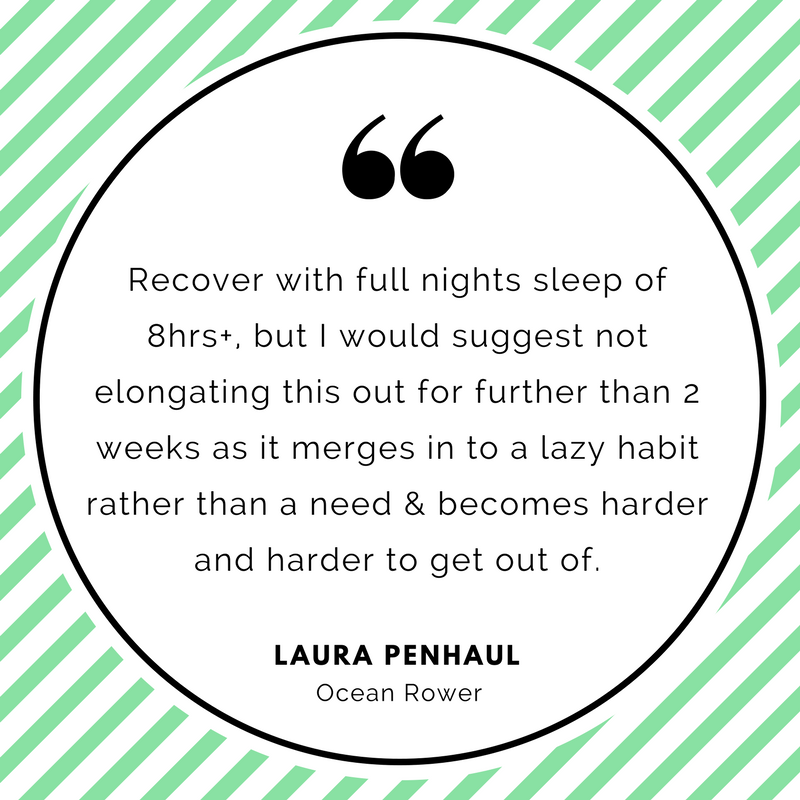
10. Take the time to look back
Reflect. Congratulate. Stop and look back. It is so important and will prevent you from forging onwards at one million miles per hour. My wonderful other half, Jamie, is obsessed with slowing down and searching for contentment. It’s something I wrote about here too after coming back from New Zealand.
There will always be the feeling that ‘things will be so much better when <insert desired promotion / object / money >, but of course that day will never come. All there is, is now – take the time to savour it.
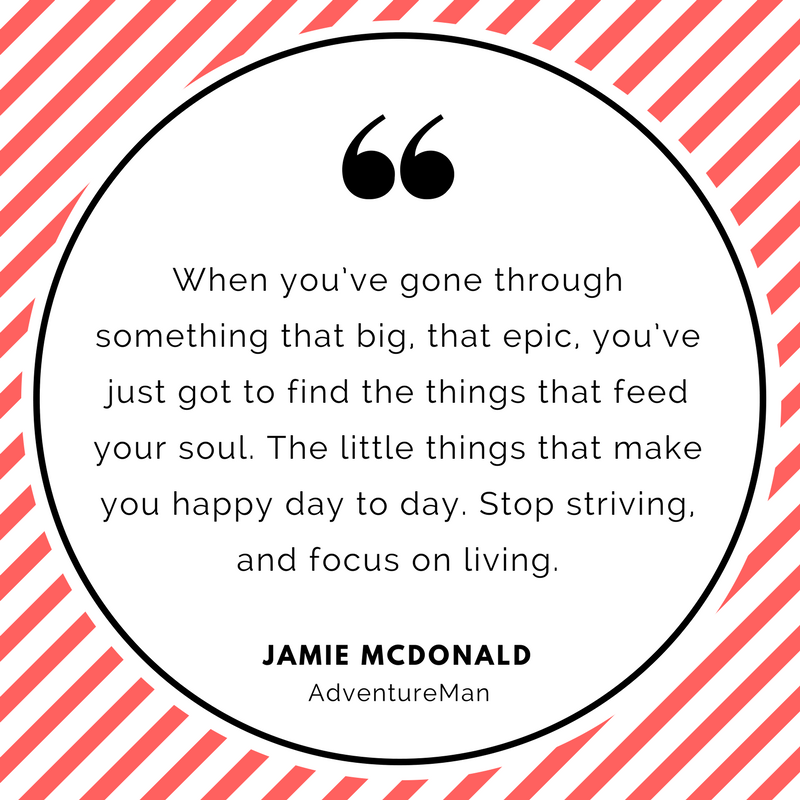
WHEN IS ENOUGH, ENOUGH?
It’s a good question, and one that you’ll face repeatedly on returning home, as you are asked the inevitable: ‘What are you doing next?’. Worse than that, you are asking yourself the very same thing, although desperately trying to pretend otherwise. It’s a fact which makes me want to shout at myself; ‘Next?! What’s next?! Did you see what I just did? Is that not enough?! Do you want BLOOD?!’
Alas, if you are on the come-down from a major challenge, you are the kind of individual for whom nothing will ever be enough. This is when, as Seth Godin puts it, life must become a dance, and not a battle. Don’t fight with ‘What next?’ – do the Waltz with it instead.
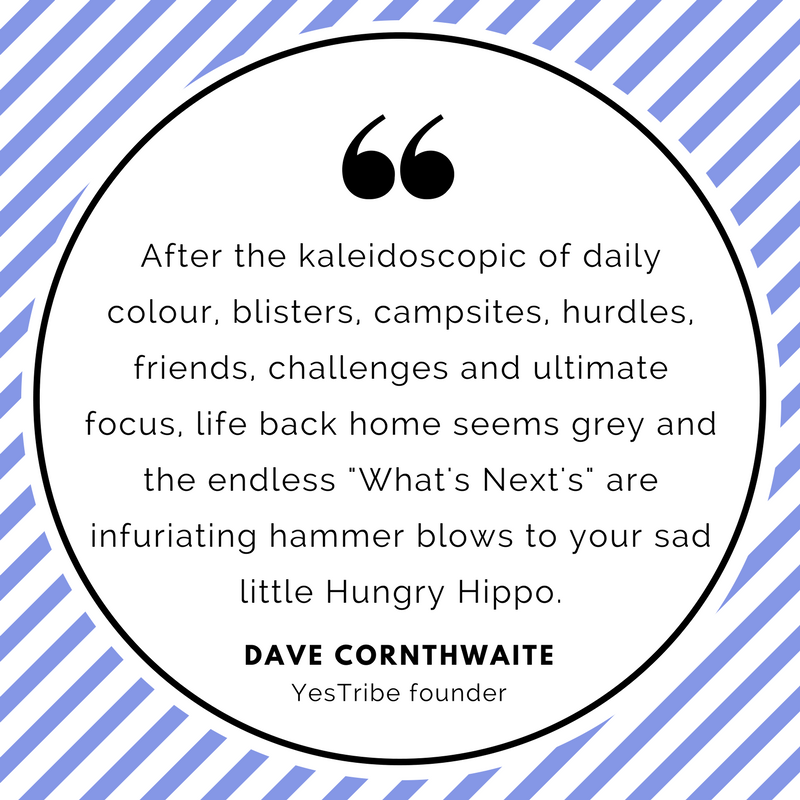
IS IT WORTH IT?
Of course it’s worth it! A million times over it’s worth it. This is life, in all it’s guises – this is what it means to be alive.
Buddhist’s say that we should welcome pain and suffering. It doesn’t happen all the time and when it does, it’s a chance to ‘practice’ how to deal with it. Although every time I return home, I forget how hard it is to squeeze a vast scatter cloud of passions, thoughts and emotions back into a more ‘normal’ existence – I wouldn’t change it for the world.
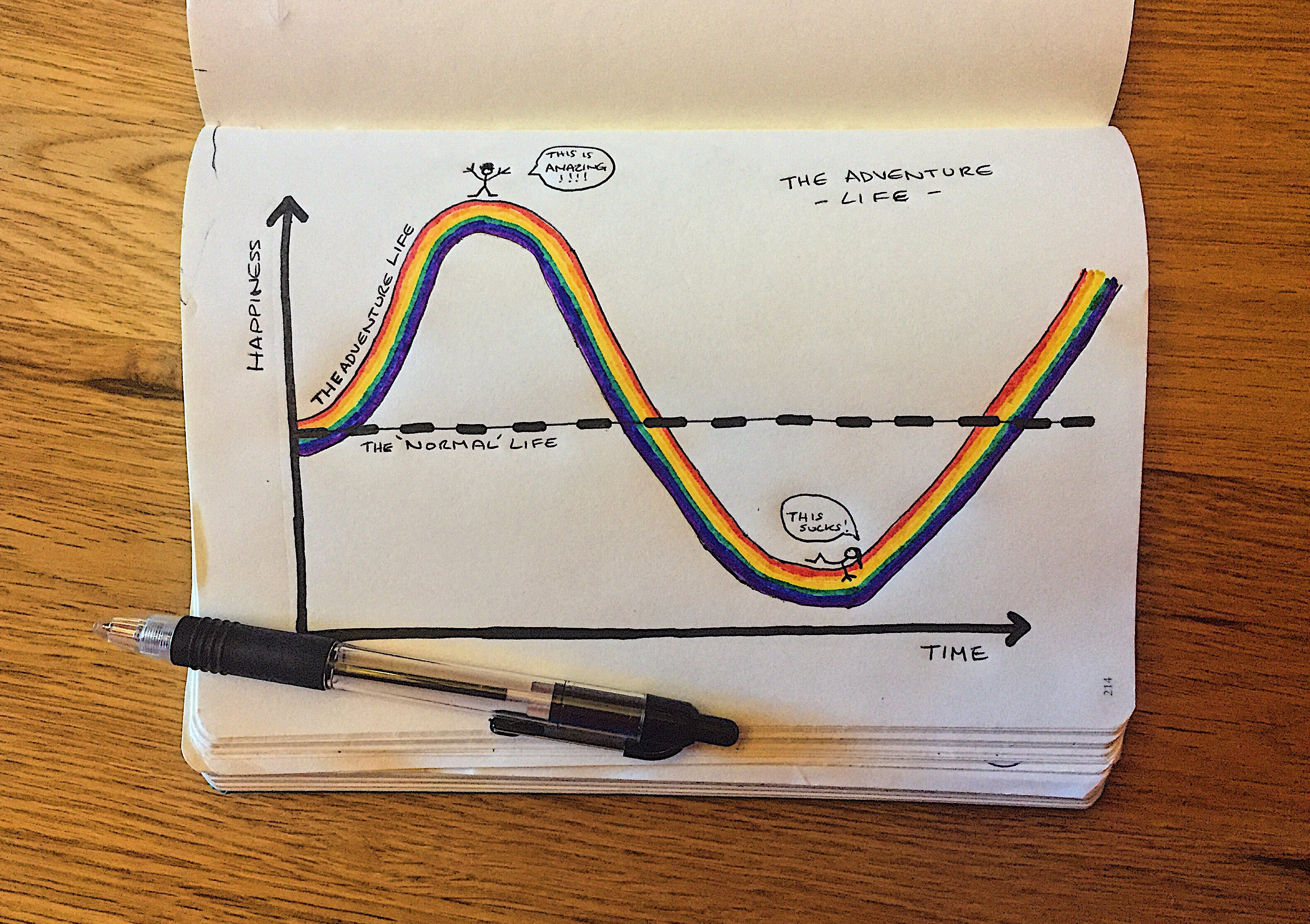
A scientific representation of The Adventure Life.
The experiences I have when I’m home allow me to grow, just as much as the adventure itself. Every time, I emerge stronger, with more clarity on life direction, and with a greater patience for myself and others.
Dark, torturous and difficult as they are, the post-adventure blues are part and parcel of a life worth living – that is a life at it’s fullest.
Until Next time,
McNuff out xx
FURTHER READING
Here are a list of articles from friends and peers that have been written on the subject of post adventure-blues. Fill yer boots!
- From Dave Cornthwaite (Adventurer and founder of The YesTribe): read this recent post (featuring hungry hippos) and this older post.
- From Sarah Outen (World Explorer): Read this by the Telegraph, and from her own mouth, this beautifully titled blog post ‘Not waving, but drowning’.
- From Alastair Humphreys (Adventurer): Read this post about what to think about before going on an adventure, as well as afterwards. And this wonderful post on looking back, 10 years after riding around the world.
- From Sean Conway (Endurance Adventurer): Read this from after his round the world cycle.
- From Emily Chappell (A cycle courier turned endurance cyclist): Read this very honest account of post-adventure depression.


Loved this thank you so much for continuing to inspire me and I know everyone else who reads it. This was exactly what I needed to read tonight and I’m ready to take on the day, well after a good 8 hours sleep that is. Sweet dreams and hope tomorrow is a fabulously creative and awe inspiring day for you too!!!
Yes Debra ‘Follow my dreams’ Register!!! You must know what this feels like more than most. I hope you got the 8 hours sleep, and that you’re riding the roller coaster today with your arms up in the air!
Fantastic post. I like to replace ‘should’ with ‘prefer”. Switches around my brain even more than ‘could’.
Also thanks for sharing your adventures. You are such an inspiration ?
‘Prefer’ is a great idea! Anything but the dreaded… SHOULD. And thank you for the kind words 🙂 🙂
Great blog, Anna. Really useful.
Thanks Louise!
I don’t think this just happens after the grand adventures. I think it happens after any time you stretch your boundaries farther than you thought you could. Once those boundaries are broken (or at least bent out of their former shape), it’s a little difficult to go back to what was previously normal for you.
This column helped me to understand that. Thanks, McNuff.
And after I made this comment, I see that you make just this point early in your article. Oops.
Ha! That’s okay, it’s a bloomin’ long read. Even I forgot what I’d written at the start by the time I made it to the end! You are bang on – adventure or not, it’s a common set of feelings – so I’m glad you got that! McNuff x
Hi Anna what an amazing! Well written! Informative piece of writing! I hope I’m on your friends todo list to come and see??? Lol !!! For abit of Donmcdon time!!!( I will make u some homemade soup for starters, followed by grilled salmon, broccoli, spinach and sweet potato and topped off with ambrosia rice, fresh fruit and broken pieces of dark chocolate!! I hope this will help you to get over your adventure blues? Lol!! Loving your posts!! Keep doing what you doing! Cheers Donald!!
Dammit Don McDon I should have added an 11th tip which was: “Get your arse over to Don McDon and Jackie’s pad – and fill yer face with veggies, fish and RICE PUDDING!!!’ That is enough to bring you out of any slump! I will be round for my ‘therapy’ soon enough, don’t you worry! Get the rice pud on ice. I hope you’ve been out and about having fun in the meantime!
Great article that really gets to grips with the after effects of a big trip away. For my wife and I the blues went away eventually but we have been left with permanent itchy feet. No regrets though. To your ‘should’ we would add ‘must’ and ‘need’. I would also recommend replacing ‘what if?’ with ‘let’s just do it!’
This is brilliant. I just came back from a long trip biking through Patagonia and have been struggling with life “re-entry”. My friend Emma (your friend too?) who I met on the trip, recommended reading your blog. I love it! Reading this article is like you are reading my mind. Thanks for this! I feel so much better.
I love this! Thank you so much. Just finished the Skye trail in Scotland – my first solo adventure – and wondering all these things! Love the idea of letting the thoughts come and hanging out with them for a while & letting the emotion come…as well as practical info re coping mechanisms. You write so well! Thanks